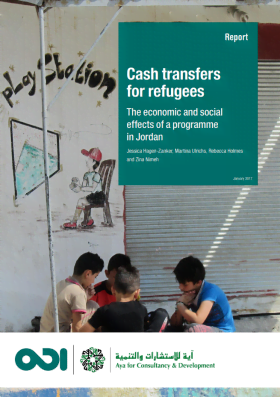Cash transfers for refugees. The economic and social effects of a programme in Jordan
The world is now experiencing the biggest refugee crisis since the second world war, with around 21.35 million refugees reported in 2015 (UNHCR, 2016a). Those countries with the highest outflow of refugees – Syria, Afghanistan and Somalia in 2015 – are facing ongoing conflicts that are unlikely to end anytime soon. In fact, most displacement crises are protracted, with 80% lasting ten years or more (Crawford et al., 2015). This means that refugees find themselves displaced for increasing periods of time, with more than half of refugees having been displaced for ten years or longer at the end of 2014.
This study begins to fill the evidence gap by looking at one social protection instrument – cash transfer programmes – for refugee populations that have settled in urban areas outside camps, and assesses the potential of cash transfers to support the long-term displaced. In particular, we assess the immediate effects of transfers on reducing barriers to accessing basic services and employment, as well as considering the long-term implications of improvements in economic and social outcomes.
We consider one specific case study – the United Nations High Commissioner for Refugees (UNHCR) cash transfer in Jordan – and draw on qualitative research conducted in four sites in September 2016. Jordan is one of the biggest host countries of refugees, both in absolute numbers (fifth place) and in relative terms compared to its population (second place).



